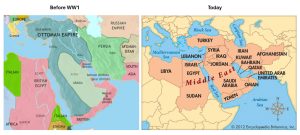When the War is Over
No. It is not the Cold Chisel song of the same name. This is about another war. Winning a war is sometimes the easy part. Managing what happens later is the hard part.
Think about the following examples. WWI ended, and the Allies, having soundly beaten the Germans and their allies, held the Paris Peace Conference in 1919 to determine what to do next. There were no or perhaps too many plans during the war as to what the world would look like after victory. The decisions taken then set the stage for future conflicts.
The Weimar Republic, faced with enormous war debt, finally collapsed, and Hitler took over. The carve-up of the Ottoman Empire led to instability in the Middle East that continues today.

Reneging on promises made by the Allies to Arab countries led to lines being drawn on maps and new countries emerging. Fights over water, land, and oil continued, and Palestine, as a British protectorate, failed. Jews started migrating to Palestine in the tens of thousands and displacing the Palestinians while the British stood by powerless to stop them.
The Soviet Union emerged as a world power. Yugoslavia was formed from the previously independent Croatia, Serbia, and Slovenia. Later, it would fracture in the Balkan War.
WWII ended with Germany divided into two. The Cold War followed because there was competition between the Western World and its former ally, Russia. They had no plan for what would happen when the war ended. In fact, there was a rush into Berlin to see who could be the first to take control and hence ownership of the German city.
In the last fifty years, we have plenty of examples of wars that led nowhere.
- The Shah of Iran was toppled, and the Islamic leaders took over. That worked out well for everyone, didn’t it?
- In Afghanistan, the Russians were opposed by the Taliban, whom the Americans financed. The Russians went home, and the Americans took their place to fight the Taliban. The Americans went home, leaving a weak government that collapsed to the Taliban.
- In Vietnam, the US fought the communists for 19 years and 5 months. They then did a hasty exit, and the communists took over.
- Nelson Mandela liberated apartheid South Africa. The promises made about sharing the wealth and housing for everyone could never be fulfilled. Crime and corruption are rampant in the country today.
- Hong Kong was returned to China by the British with assurances that the way of life in Hong Kong would be preserved. It didn’t last a decade.
I could go on, but when countries go through a tradition, it is usually a band-aid solution which fails in the long term to achieve the goals of the struggle to change things. Failure to have a plan for peace goes back centuries– think about the end of colonial times in many countries – and even back through civilisations.
 All this brings us to today in the Middle East. Israel does not seem to know what to do in Gaza. They bomb and starve people in the name of destroying Hamas. I would suggest that the structural part of Hamas is probably destroyed, but there is a new spiritual Hamas. A new group of people with a hatred of Israel for what they have done to the Palestinian people. A group that will grow into a new resistance bent on avenging the family members slaughtered by Israel. It might not be called Hamas, but it will still carry the hatred Hamas had for the Jews.
All this brings us to today in the Middle East. Israel does not seem to know what to do in Gaza. They bomb and starve people in the name of destroying Hamas. I would suggest that the structural part of Hamas is probably destroyed, but there is a new spiritual Hamas. A new group of people with a hatred of Israel for what they have done to the Palestinian people. A group that will grow into a new resistance bent on avenging the family members slaughtered by Israel. It might not be called Hamas, but it will still carry the hatred Hamas had for the Jews.
I cannot fathom what Israel thought they would do when they won the war. Would they occupy Gaza with tens of thousands of troops? What sort of government did they have in mind? Was the real agenda to wipe out the Palestinians in an act of genocide? Did they hope the few remaining Palestinians would flee to another country? No wonder Egypt closed its border to Gaza.
Now we have Israel attacking Iran. What is the endgame? On one side, you have a theocracy that is hardly the most committed to human rights, and on the other side, a so-called right-wing democracy that has no compunction about killing and starving non-citizens. There is a military mismatch in that one side has one of the most effective military forces in the world, and the other has more bodies but is less effective.
Assume the Israelis convince America to blow up the nuclear mountain. The Israelis kill the Ayatollah. What do they do after that? No threat from nuclear weapons, but Iran has lost most of its leadership. Are they going to occupy Iran? Gaza has 2.2 million inhabitants. Iran has 90 million. Israel only has 10 million.
Suppose after they do their damage, Israel walks away. Iran is likely to turn into a power struggle between opposing tribes. According to a 2003 estimate, Persians make up 51% of the population, while Azerbaijanis make up 24%, Gilaks and Mazenderanis 8%, Kurds 7%, Arabs 3%, Lurs 2%, Balochis 2%, and Turkmens 2%. Perhaps the Persian majority will take control and align with the 46 million in Iraq against Israel. Maybe the army will take over and turn the country into a more militaristic one. More of a threat to Israel.

It is naïve to believe that an autocracy can become a democracy overnight. Many have failed, including the German Weimar Republic, Russia, Venezuela, Myanmar, Egypt, Zimbabwe and Thailand. The reasons are:
- Weak Institutions. No bureaucratic or judicial support mechanisms can operate with a democratically elected Government.
- Economic Instability. The reason for a switch from autocracy is usually a basket-case economy. People expect miracles, and they never happen.
- Deep divisions, either ethnically or religiously, often rise to the surface once the autocracy goes. It makes consensus difficult and fosters internal competition.
- It often ends with the military stepping in to restore order.
- Lack of Democratic Culture. In a country where democracy has been in place for decades, democracy is understood. In a new democracy, people have to learn. Is a bag of rice for a vote OK? Can palms be greased? What makes a good member of government?
- External Influence. Other countries are tempted to meddle in elections either overtly by supporting candidates they prefer, or covertly by changing votes or challenging results.
In summary, the endgame is the most important thing, but nobody is either talking about it or perhaps not thinking about it. Maybe the endgame is already known to Israel, but if the rest of the world knew, they would face even more resistance.






